- Home
- Anthony Trollope
Marion Fay: A Novel Page 2
Marion Fay: A Novel Read online
Page 2
CHAPTER II.
LORD HAMPSTEAD.
Lord Hampstead, though he would not go into Parliament or belong toany London Club, or walk about the streets with a chimney-pot hat, orperform any of his public functions as a young nobleman should do,had, nevertheless, his own amusements and his own extravagances.In the matter of money he was placed outside his father'sliberality,--who was himself inclined to be liberal enough,--by thefact that he had inherited a considerable portion of his maternalgrandfather's fortune. It might almost be said truly of him thatmoney was no object to him. It was not that he did not often talkabout money and think about money. He was very prone to do so, sayingthat money was the most important factor in the world's justices andinjustices. But he was so fortunately circumstanced as to be ableto leave money out of his own personal consideration, never beingdriven by the want of it to deny himself anything, or tempted by asuperabundance to expenditure which did not otherwise approve itselfto him. To give 10_s._ or 20_s._ a bottle for wine because somebodypretended that it was very fine, or L300 for a horse when one at aL100 would do his work for him, was altogether below his philosophy.By his father's lodge gate there ran an omnibus up to town which hewould often use, saying that an omnibus with company was better thana private carriage with none. He was wont to be angry with himselfin that he employed a fashionable tailor, declaring that he incurredunnecessary expense merely to save himself the trouble of goingelsewhere. In this, however, it may be thought that there wassomething of pretence, as he was no doubt conscious of good looks,and aware probably that a skilful tailor might add a grace.
In his amusements he affected two which are especially expensive.He kept a yacht, in which he was accustomed to absent himself inthe summer and autumn, and he had a small hunting establishment inNorthamptonshire. Of the former little need be said here, as he spenthis time on board much alone, or with friends with whom we neednot follow him; but it may be said that everything about the _FreeTrader_ was done well,--for such was the name of the vessel. Thoughhe did not pay 10_s._ a bottle for his wine, he paid the best pricefor sails and cordage, and hired a competent skipper to look afterhimself and his boat. His hunting was done very much in the sameway,--unless it be that in his yachting he was given to be tranquil,and in his hunting he was very fond of hard riding. At Gorse Hall, ashis cottage was called, he had all comforts, we may perhaps say muchof luxury, around him. It was indeed hardly more than a cottage,having been an old farm-house, and lately converted to its presentpurpose. There were no noble surroundings, no stately hall, no marblestaircases, no costly salon. You entered by a passage which deservedno auguster name, on the right of which was the dining-room; on theleft a larger chamber, always called the drawing-room because ofthe fashion of the name. Beyond that was a smaller retreat in whichthe owner kept his books. Leading up from the end of the passagethere was a steep staircase, a remnant of the old farm-house, andabove them five bed-rooms, so that his lordship was limited to thenumber of four guests. Behind this was the kitchen and the servants'rooms--sufficient, but not more than sufficient, for such a house.Here our young democrat kept half-a-dozen horses, all of them--as menaround were used to declare--fit to go, although they were said tohave been bought at not more than L100 each. It was supposed to be acrotchet on the part of Lord Hampstead to assert that cheap thingswere as good as dear, and there were some who believed that he did intruth care as much for his horses as other people. It was certainly afact that he never would have but one out in a day, and he was wontto declare that Smith took out his second horse chiefly that Jonesmight know that he did so. Down here, at Gorse Hall, the Post Officeclerk had often been received as a visitor,--but not at Gorse Hallhad he ever seen Lady Frances.
This lord had peculiar ideas about hunting, in reference to sport ingeneral. It was supposed of him, and supposed truly, that no youngman in England was more devotedly attached to fox-hunting thanhe,--and that in want of a fox he would ride after a stag, and inwant of a stag after a drag. If everything else failed he would gohome across the country, any friend accompanying him, or else alone.Nevertheless, he entertained a vehement hostility against all othersports.
Of racing he declared that it had become simply a way of makingmoney, and of all ways the least profitable to the world and the mostdisreputable. He was never seen on a racecourse. But his enemiesdeclared of him, that though he loved riding he was no judge of ananimal's pace, and that he was afraid to bet lest he should lose hismoney.
Against shooting he was still louder. If there was in his country anytradition, any custom, any law hateful to him, it was such as hadreference to the preservation of game. The preservation of a fox, hesaid, stood on a perfectly different basis. The fox was not preservedby law, and when preserved was used for the advantage of all whochose to be present at the amusement. One man in one day would shootfifty pheasants which had eaten up the food of half-a-dozen humanbeings. One fox afforded in one day amusement to two hundredsportsmen, and was--or more generally was not--killed during theperformance. And the fox during his beneficial life had eaten nocorn, nor for the most part geese,--but chiefly rats and such like.What infinitesimal sum had the fox cost the country for every man whorushed after him? Then, what had been the cost of all those pheasantswhich one shooting cormorant crammed into his huge bag during oneday's greedy sport?
But it was the public nature of the one amusement and the thoroughlyprivate nature of the other which chiefly affected him. In thehunting-field the farmer's son, if he had a pony, or the butcher-boyout of the town, could come and take his part; and if the butcher-boycould go ahead and keep his place while the man with a red coat andpink boots and with two horses fell behind, the butcher-boy wouldhave the best of it, and incur the displeasure of no one. And thelaws, too, by which hunting is governed, if there be laws, arethoroughly democratic in their nature. They are not, he said, made byany Parliament, but are simply assented to on behalf of the commonneed. It was simply in compliance with opinion that the lands of allmen are open to be ridden over by the men of the hunt. In compliancewith opinion foxes are preserved. In compliance with opinion covertsare drawn by this or the other pack of hounds. The Legislature hadnot stepped in to defile the statute book by bye-laws made in favourof the amusements of the rich. If injury were done, the ordinary lawsof the country were open to the injured party. Anything in huntingthat had grown to be beyond the reach of the law had become so by theforce of popular opinion.
All of this was reversed in shooting, from any participation in whichthe poor were debarred by enactments made solely on behalf of therich. Four or five men in a couple of days would offer up hecatombsof slaughtered animals, in doing which they could only justifythemselves by the fact that they were acting as poultry-butchers forthe supply of the markets of the country. There was no excitementin it,--simply the firing off of many guns with a rapidity whichaltogether prevents that competition which is essential tothe enjoyment of sport. Then our noble Republican would quoteTeufelsdroeckh and the memorable epitaph of the partridge-slayer. Butit was on the popular and unpopular elements of the two sports thathe would most strongly dilate, and on the iniquity of the game-lawsas applying to the more aristocratic of the two. It was, however,asserted by the sporting world at large that Hampstead could not hita haystack.
As to fishing, he was almost equally violent, grounding his objectionon the tedium and cruelty incident to the pursuit. The first was onlya matter of taste, he would allow. If a man could content himself andbe happy with an average of one fish to every three days' fishing,that was the man's affair. He could only think that in such case theman himself must be as cold-blooded as the fish which he so seldomsucceeded in catching. As to the cruelty, he thought there could beno doubt. When he heard that bishops and ladies delighted themselvesin hauling an unfortunate animal about by the gills for more than anhour at a stretch, he was inclined to regret the past piety of theChurch and the past tenderness of the sex. When he spoke in this waythe cruelty of fox-hunting was of course thrown in his teeth.
Didnot the poor hunted quadrupeds, when followed hither and thither bya pack of fox-hounds, endure torments as sharp and as prolonged asthose inflicted on the fish? In answer to this Lord Hampstead waseloquent and argumentative. As far as we could judge from Nature thecondition of the two animals during the process was very different.The salmon with the hook in its throat was in a position certainlynot intended by Nature. The fox, using all its gifts to avoid anenemy, was employed exactly as Nature had enjoined. It would be asjust to compare a human being impaled alive on a stake with anotheroverburdened with his world's task. The overburdened man mightstumble and fall, and so perish. Things would have been hard tohim. But not, therefore, could you compare his sufferings with theexcruciating agonies of the poor wretch who had been left to lingerand starve with an iron rod through his vitals. This argument wasthought to be crafty rather than cunning by those who were fond offishing. But he had another on which, when he had blown off thesteam of his eloquence by his sensational description of a salmonimpaled by a bishop, he could depend with greater confidence. Hewould grant,--for the moment, though he was by no means sure of thefact,--but for the moment he would grant that the fox did not enjoythe hunt. Let it be acknowledged--for the sake of the argument--thathe was tortured by the hounds rather than elated by the triumphantsuccess of his own manoeuvres. Lord Hampstead "ventured tosay,"--this he would put forward in the rationalistic tone with whichhe was wont to prove the absurdity of hereditary honours,--"that inthe infliction of all pain the question as to cruelty or no crueltywas one of relative value." Was it "tanti?" Who can doubt that fora certain maximum of good a certain minimum of suffering may beinflicted without slur to humanity? In hunting, one fox was made tofinish his triumphant career, perhaps prematurely, for the advantageof two hundred sportsmen. "Ah, but only for their amusement!" wouldinterpose some humanitarian averse equally to fishing and to hunting.Then his lordship would arise indignantly and would ask his opponent,whether what he called amusement was not as beneficial, as essential,as necessary to the world as even such material good things as breadand meat. Was poetry less valuable than the multiplication table?Man could exist no doubt without fox-hunting. So he could withoutbutter, without wine, or other so-called necessaries;--without erminetippets, for instance, the original God-invested wearer of which hadbeen doomed to lingering starvation and death when trapped amidst thesnow, in order that one lady might be made fine by the agonies of adozen little furry sufferers. It was all a case of "tanti," he said,and he said that the fox who had saved himself half-a-dozen timesand then died nobly on behalf of those who had been instrumental inpreserving an existence for him, ought not to complain of the lotwhich Fate had provided for him among the animals of the earth. Itwas said, however, in reference to this comparison between fishingand fox-hunting, that Lord Hampstead was altogether deficient in thatskill and patience which is necessary for the landing of a salmon.
But men, though they laughed at him, still they liked him. He wasgood-humoured and kindly-hearted. He was liberal in more than hispolitics. He had, too, a knack of laughing at himself, and his ownpeculiarities, which went far to redeem them. That a young Earl, anembryo Marquis, the heir of such a house as that of Trafford, shouldpreach a political doctrine which those who heard ignorantly calledCommunistic, was very dreadful; but the horror of it was mitigatedwhen he declared that no doubt as he got old he should turn Torylike any other Radical. In this there seemed to be a covert allusionto his father. And then they could perceive that his "Communistic"principles did not prevent him from having a good eye to the value ofland. He knew what he was about, as an owner of property should do,and certainly rode to hounds as well as any one of the boys of theperiod.
When the idea first presented itself to him that his sister was onthe way to fall in love with George Roden, it has to be acknowledgedthat he was displeased. It had not occurred to him that this peculiarbreach would be made on the protected sanctity of his own family.When Roden had spoken to him of this sanctity as one of the "socialidolatries," he had not quite been able to contradict him. He hadwished to do so both in defence of his own consistency, and also,if it were possible, so as to maintain the sanctity. The "divinity"which "does hedge a king," had been to him no more than a socialidolatry. The special respect in which dukes and such like wereheld was the same. The judge's ermine and the bishop's apron wereidolatries. Any outward honour, not earned by the deeds or words ofhim so honoured, but coming from birth, wealth, or from the doingsof another, was an idolatry. Carrying on his arguments, he could notadmit the same thing in reference to his sister;--or rather, he wouldhave to admit it if he could not make another plea in defence ofthe sanctity. His sister was very holy to him;--but that should bebecause of her nearness to him, because of her sweetness, becauseof her own gifts, because as her brother he was bound to be herespecial knight till she should have chosen some other special knightfor herself. But it should not be because she was the daughter,granddaughter, and great-granddaughter of dukes and marquises. Itshould not be because she was Lady Frances Trafford. Had he himselfbeen a Post Office clerk, then would not this chosen friend have beenfit to love her? There were unfitnesses, no doubt, very common inthis world, which should make the very idea of love impossible to awoman,--unfitness of character, of habits, of feelings, of education,unfitnesses as to inward personal nobility. He could not say thatthere were any such which ought to separate his sister and hisfriend. If it was to be that this sweet sister should some day giveher heart to a lover, why not to George Roden as well as to another?There were no such unfitnesses as those of which he would havethought in dealing with the lives of some other girl and some otheryoung man.
And yet he was, if not displeased, at any rate dissatisfied.There was something which grated against either his taste, or hisjudgment,--or perhaps his prejudices. He endeavoured to inquire intohimself fairly on this matter, and feared that he was yet the victimof the prejudices of his order. He was wounded in his pride to thinkthat his sister should make herself equal to a clerk in the PostOffice. Though he had often endeavoured, only too successfully, tomake her understand how little she had in truth received from herhigh birth, yet he felt that she had received something which shouldhave made the proposal of such a marriage distasteful to her. A mancannot rid himself of a prejudice because he knows or believes itto be a prejudice. That the two, if they continued to wish it, mustbecome man and wife he acknowledged to himself;--but he could notbring himself not to be sorry that it should be so.
There were some words on the subject between himself and his fatherbefore the Marquis went abroad with his family, which, though theydid not reconcile him to the match, lessened the dissatisfaction. Hisfather was angry with him, throwing the blame of this untoward affairon his head, and he was always prone to resent censure thrown by anyof his family on his own peculiar tenets. Thus it came to pass thatin defending himself he was driven to defend his sister also. TheMarquis had not been at Hendon when the revelation was first made,but had heard it in the course of the day from his wife. His Radicaltendencies had done very little towards reconciling him to sucha proposal. He had never brought his theories home into his ownpersonalities. To be a Radical peer in the House of Lords, and tohave sent a Radical tailor to the House of Commons, had been enough,if not too much, to satisfy his own political ideas. To himself andto his valet, to all those immediately touching himself, he hadalways been the Marquis of Kingsbury. And so also, in his innerheart, the Marchioness was the Marchioness, and Lady Frances LadyFrances. He had never gone through any process of realizing hisconvictions as his son had done. "Hampstead," he said, "can thispossibly be true what your mother has told me?" This took place atthe house in Park Lane, to which the Marquis had summoned his son.
"Do you mean about Frances and George Roden?"
"Of course I mean that."
"I supposed you did, sir. I imagined that when you sent for me it wasin regard to them. No doubt it is true."
"What is true? You speak as though you absolutely approved it."
"Then my voice has belied me, for I disapprove of it."
"You feel, I hope, how utterly impossible it is."
"Not that."
"Not that?"
"I cannot say that I think it to be impossible,--or even improbable.Knowing the two, as I do, I feel the probability to be on theirside."
"That they--should be married?"
"That is what they intend. I never knew either of them to meananything which did not sooner or later get itself accomplished."
"You'll have to learn it on this occasion. How on earth can it havebeen brought about?" Lord Hampstead shrugged his shoulders. "Somebodyhas been very much to blame."
"You mean me, sir?"
"Somebody has been very much to blame."
"Of course, you mean me. I cannot take any blame in the matter. Inintroducing George Roden to you, and to my mother, and to Frances,I brought you to the knowledge of a highly-educated and extremelywell-mannered young man."
"Good God!"
"I did to my friend what every young man, I suppose, does to his. Ishould be ashamed of myself to associate with any one who was not aproper guest for my father's table. One does not calculate beforethat a young man and a young woman shall fall in love with eachother."
"You see what has happened."
"It was extremely natural, no doubt,--though I had not anticipatedit. As I told you, I am very sorry. It will cause many heartburns,and some unhappiness."
"Unhappiness! I should think so. I must go away,--in the middle ofthe Session."
"It will be worse for her, poor girl."
"It will be very bad for her," said the Marquis, speaking as thoughhis mind were quite made up on that matter.
"But nobody, as far as I can see, has done anything wrong," continuedLord Hampstead. "When two young people get together whose tastes aresimilar, and opinions,--whose educations and habits of thought havebeen the same--"
"Habits the same!"
"Habits of thought, I said, sir."
"You would talk the hind legs off a dog," said the Marquis, bouncingout of the room. It was not unusual with him, in the absolute privacyof his own circle, to revert to language which he would have felt tobe unbecoming to him as Marquis of Kingsbury among ordinary people.

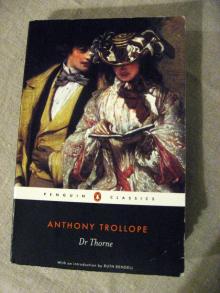 Doctor Thorne
Doctor Thorne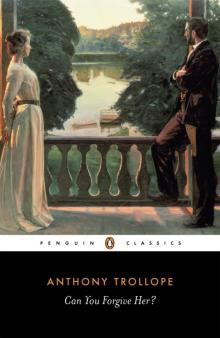 Can You Forgive Her?
Can You Forgive Her?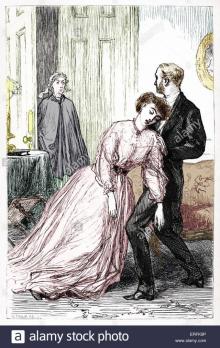 The Last Chronicle of Barset
The Last Chronicle of Barset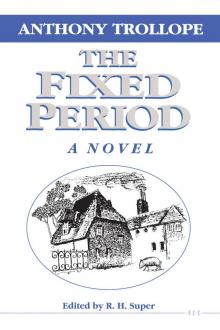 The Fixed Period
The Fixed Period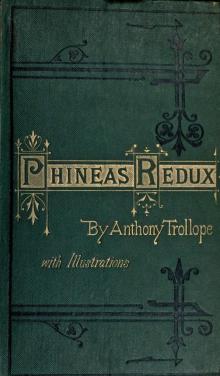 Phineas Redux
Phineas Redux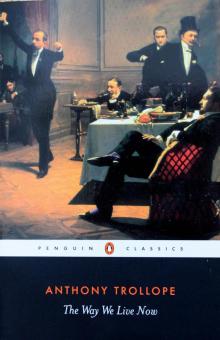 The Way We Live Now
The Way We Live Now Castle Richmond
Castle Richmond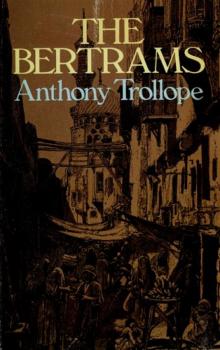 The Bertrams
The Bertrams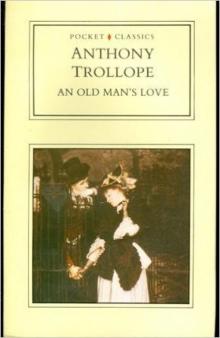 An Old Man's Love
An Old Man's Love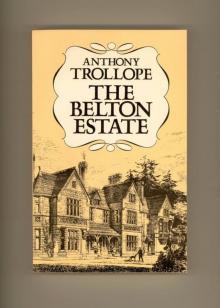 The Belton Estate
The Belton Estate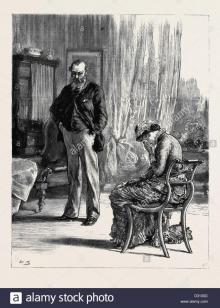 Marion Fay: A Novel
Marion Fay: A Novel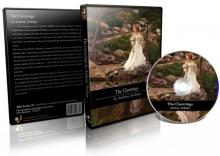 The Claverings
The Claverings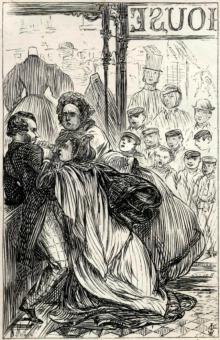 The Struggles of Brown, Jones, and Robinson
The Struggles of Brown, Jones, and Robinson Nina Balatka
Nina Balatka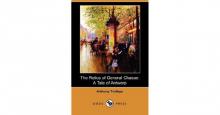 The Relics of General Chasse: A Tale of Antwerp
The Relics of General Chasse: A Tale of Antwerp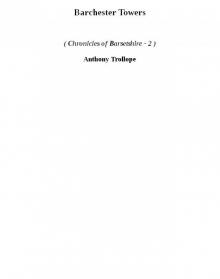 Barchester Towers cob-2
Barchester Towers cob-2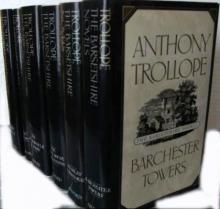 The Chronicles of Barsetshire
The Chronicles of Barsetshire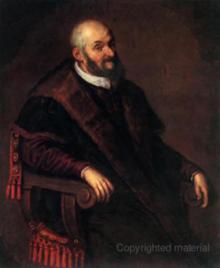 The Warden cob-1
The Warden cob-1 Framley Parsonage
Framley Parsonage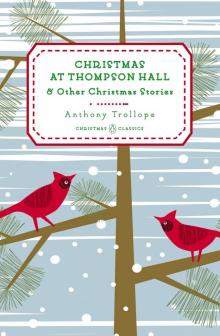 Christmas at Thompson Hall
Christmas at Thompson Hall The Warden
The Warden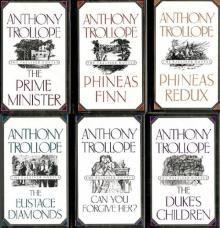 The Palliser Novels
The Palliser Novels The Small House at Allington
The Small House at Allington Barchester Towers
Barchester Towers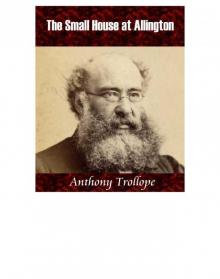 The Small House at Allington cob-5
The Small House at Allington cob-5 The Duke's Children
The Duke's Children Phineas Finn, the Irish Member
Phineas Finn, the Irish Member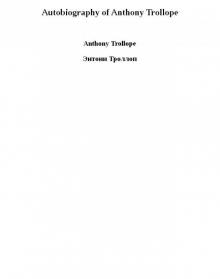 Autobiography of Anthony Trollope
Autobiography of Anthony Trollope